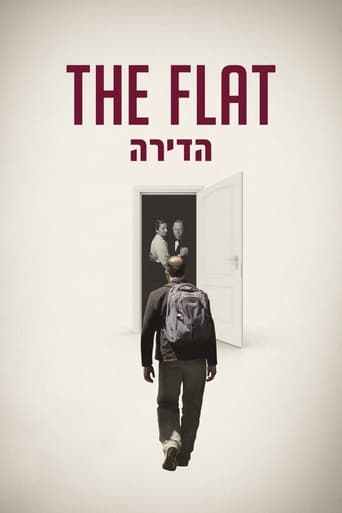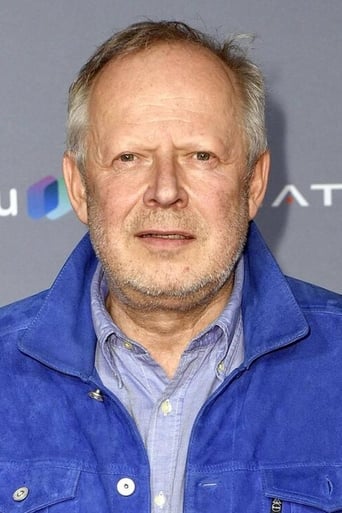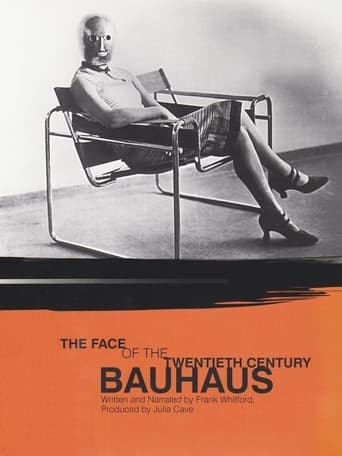The Flat (2011)
The flat on the third floor of a Bauhaus building in Tel Aviv was where my grandparents lived since they immigrated to Palestine in the 1930s. Were it not for the view from the windows, one might have thought that the flat was in Berlin. When my grandmother passed away at the age of 98 we were called to the flat to clear out what was left. Objects, pictures, letters and documents awaited us, revealing traces of a troubled and unknown past. The film begins with the emptying out of a flat and develops into a riveting adventure, involving unexpected national interests, a friendship that crosses enemy lines, and deeply repressed family emotions. And even reveals some secrets that should have probably remained untold...
Watch Trailer
Cast
Similar titles
Reviews
I like the storyline of this show,it attract me so much
The story-telling is good with flashbacks.The film is both funny and heartbreaking. You smile in a scene and get a soulcrushing revelation in the next.
I enjoyed watching this film and would recommend other to give it a try , (as I am) but this movie, although enjoyable to watch due to the better than average acting fails to add anything new to its storyline that is all too familiar to these types of movies.
It is an exhilarating, distressing, funny and profound film, with one of the more memorable film scores in years,
Arnon Goldfinger always felt that when he went to visit his grandmother in her flat in Tel Aviv that he was going to Berlin. She had emigrated with her husband to Palestine in the 1930s. Gerda Tuchler lived a long, rich life dying at 98. Death lives a void, and it's to the living to go through a flat cluttered with things that Oma Gerda collected through a long life time. And in sifting through Gerda's papers he comes across copies of the Nazi 'Der Angriff' (Attack), featuring articles by Baron Heinrich Mildstein untitled 'A Nazi travels to Palestine'. And accompanying him were the Tuchlers. This shock sent on a long journey to lift up the veil of his grandparents hidden life. For Mildstein, it turns out, was the man who hired Eichmann, and later served in a high post in Josef Goebbels' interior ministry. And more shocking still is that even after the defeat of Nazi Germany, the Tuchlers renewed a friendship with the Mildsteins with whom they had exchanged letter until 1939 and then after the war. Not only that, they traveled to Europe, to visit them and even went on holidays in their company. And it is this mystery that Goldfinger tries to understand. His mother Hannah who was born in Germany, had forgotten the Mildsteinsl even though Gerda had kept photos of her youngest and only daughter with them. Arnon's mother turned her eyes on a new life in a new homeland, and she, too, never asked questions of her her mother life in Germany. And although 'The Flat' offers answer, and is a engrossing film, Goldfinger never really pierces the psyche of his grandparents attachment to Germany and to the Mildsteins. 'The Flat' is not an easy film, and it might make Jews in the Diaspora shrug shoulders and look down their noses at the 'Yeckers', the not so Yiddish term for German Jews whom they thought looked at the world from a superior regard.
I had never heard of this film as we don't get many documentaries in our area and if it was shown at a Jewish film festival, it would have eluded me. Although this is a documentary focused on the holocaust, primarily whet I took away; is that there are people who want to be realists and deal with the truths of their own and the lives of others and there are those who live lives of denial. It is my opinion that the second type of people actually endanger not only themselves but those they may love very much.I knew people who themselves had been in camps or were the children of those who had been, but I had never stopped to consider the "lapping" over of lives of those who had been persecutors and persecuted. And of course there must be many such instances of this.Many people on the message boards have criticized Aron Goldfinger for confronting the daughter, Edda, of the Von Mildensteins. But why should he not have done so? She said her father was traveling in Japan during the war, but did his grandparents receive any letters from his travels then? I was sort of disgusted with both husband and wife in that situation. that the camps had been Russian and American propaganda, I am roughly the same age as Hannah and Edda and believe me I would have known if all the Jewish children in my school had disappeared. What do they think happened to those people. Where are all the other Arons that should have populated Germany? They never got born because there parents died in the camps.Through one of those odd twists of fate I became involved in a correspondence with a woman whose parents had been very prominent in Hitlar's Nazi Germany. When it was found that one of the couple were not completely Aryan they had to leave Germany and settled with their large family in the town I now live in. When I first heard from one of these children I did research in the newspaper archives here, and like Edda my correspondent was very desirous of explaining away her parents involvement in events that took place in Germany.We here in the United States are supposed to continue to feel guilty about the fact that this country once allowed slavery. No one alive today owned a slave here, and many are descended from people who did not even live in America during slave owning years. But there are many in Germany who lived though those years of 1930 and 1940 and who claim to have no knowledge of anything unpleasant that happened, except to themselves. As we learn Edda and her husband had spent many years living in England.My husband and I are both very pleased that we saw this wonderful documentary and we both liked Aron very much.
'Compartmentalization' is a type of psychological defense mechanism where a person has very conflicting values and/or behaviors and keeps them separate in their mind in order to avoid discomfort. An example would be a man who beats his wife and kids and yet otherwise appears to be a pillar of the community. While the term is never used in "The Flat", compartmentalization is a HUGE theme throughout this very unusual film.Aron Goldfinger made this documentary (using simple equipment) about his grandparents. It seemed when his grandmother died in her late 90s, the family began taking all of the old woman's things out of the apartment she had shared with her husband for many years in Tel Aviv, Isreal. During this process, something very strange turned up--a collection of photos and correspondences between the grandparents (the Tuchlers) and the von Mildensteins back in Germany. What made this so strange? Well, the Tuchlers were Jews who left Germany to avoid the Holocaust and Mr. von Mildenstein was a high Nazi official! In fact, although his own family today didn't know it (they thought he was a reporter), von Mildenstein actually hired Adolf Eichmann (one of the major architects of the 'final solution') and later worked for Josef Goebbels' Propaganda Ministry--and yet, as I said above, the Tuchlers and von Mildensteins remained friends and even visited each other in the years AFTER WWII! Yet, Mrs. Tuchler's own mother was killed by the Nazis! Wild, weird and a bit sad---this is a very unusual film that will pique your curiosity. Overall, a very intriguing little film indeed!
The death of six million Jews in Nazi concentration camps during World War II is a well known fact. What is less known and generally not talked about is that there were Jews who, for whatever reason, collaborated with the Nazis. Though Jews were forbidden to join the Nazi Party, some were members of the ghetto police that helped round up Jews for deportation, some were known as Judenrats who, under Nazi orders, compiled a list of other Jews to be deported. Others edited pro-Nazi anti-Semitic magazines, turned in fugitive Jews hiding under false identities, or were informers and Kapos who served as Nazi enforcers in the concentration camps.The issue of possible Jewish collaboration comes up in Amon Goldfinger's award-winning documentary The Flat, a story of three generations of Jews seeking to come to terms with uncomfortable events in their family history. A short time after their 98-year-old grandmother dies in Tel Aviv, the son Amon, who is also the writer and director of the film, together with his mother Hannah begin the process of going through mountains of the grandmother's accumulated belongings including books, clothes, antiques, letters, and photos. It is readily apparent that the grandparents, Gerda and Kurt Tuchler, who came to Palestine from Germany at the beginning of the war, retained a strong identity with the old country."They never leave their homeland behind," Amon remarks, noticing that Gerda's books are all in German and that neither of his grandparents ever learned Hebrew. He also discovers a strange two-sided coin that has a Star of David on one side, and a Nazi swastika on the other side. In looking through piles of letters, Amon is baffled by finding a Nazi propaganda newspaper, Der Angriff, containing an article titled "A Nazi in Palestine," showing pictures of his grandparents accompanied by SS member Baron von Mildenstein, and his wife during a trip to Palestine in 1934. After more searching, Amon finds that other letters and photos reveal that the Tuchlers maintained a friendship with the Mildensteins during and even after the war, even though Gerda's mother had been killed at Theresienstadt.Mother and son travel to Berlin to meet with their remaining relatives and try to make some sense of the relationship their grandparents had with the von Mildensteins. They also travel to Wuppertal, Germany to engage in conversation with the Mildenstein's daughter Edda. In the beginning, the discussion is friendly but becomes more and more uncomfortable as Edda repeatedly denies that her father was ever a Nazi official. Unwilling or unable to confront deeply unpleasant truths, Hannah insists that she knows nothing about her parent's friendship with the Mildensteins, had never asked about it, and that children in her day were brought up to not ask any questions.Though the truth is incomplete and still uncertain in its scope and detail, both Edda and Hannah remain in denial that anything out of the ordinary took place, unwilling to confront troubling aspects of the Jewish past. The Flat is short on dramatics but it serves as a potent reminder that, as author Andrew Sullivan has said, "When there's a challenge to our established world-view, whether from the absurd, the unexpected, the unpalatable, the confusing or the unknown, we experience a psychological force pushing back, trying to re-assert the things we feel are safe, comfortable, and familiar," or as Matthew Henry put it, "None are so blind as those who will not see."






